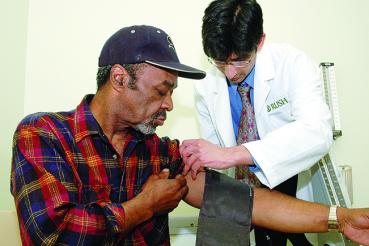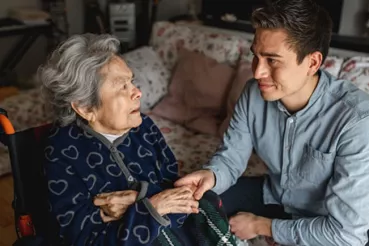Is your current living situation still working, or is it time to make a move?
While you may want to avoid it, it’s a conversation that — at some point — you should have with yourself, your family and your doctor. Melissa Frey, LCSW, a social worker at Rush, has helped many individuals and families work through this decision-making process.
Here, she offers her thoughts on what you should consider regarding living arrangements as you age.
Plan ahead
“Nothing is more empowering than having your own plan, and it’s never too early to have ‘what if’ conversations,” Frey says. So ask yourself how and where you’d want to live if you needed extra help.
If you are like most Americans and want to stay in your home, ask yourself these questions:
- Do you have the financial resources to remain there and afford in-home care and any necessary home modifications (e.g., ramps for wheelchairs, railings in the bathroom)?
- What are your thoughts about assisted-living or senior communities?
- Is living with a relative an option? If yes, which relative? And are they open to having you live with them? Be honest with yourself when it comes to family dynamics; while we may love our children, we may not always live well with them.
Do your homework
Begin your research by doing the following:
- Evaluate your finances and insurance coverage
- Talk to your family about their feelings and financial capabilities
- Visit assisted-living and senior facilities. Try an unscheduled visit, which might give you even better insights into the environment.
How’s it working for you?
While you may envision making a change down the line, you might not see yourself as needing help right now. Others in your life, however, may think that it’s time you make a move, and that could be a source of conflict.
A good, objective way to determine what’s best for you: Perform an assessment to see if your current situation meets your health and safety needs. If you need help doing this, reach out to a social worker or your doctor.
Questions to ask include the following:
- Can you prepare your own meals and eat nutritious, regular meals?
- Can you use the bathroom without assistance?
- Can you dress yourself?
- Are you taking medications as prescribed?
- Are you paying bills in a timely manner?
- Are you safe (e.g., are you turning off the stove and the electric space heater after each use, blowing out candles, not in danger of falling, etc.)?
If the problem is more complex and your safety is at risk, a social worker or doctor, or both, can work with you and your family to explore options and find solutions.
If you answer “yes” to all the questions, you’re doing well and probably don’t need to make any changes. But if you answer “no” to any of them, it might be a good time to talk to a social worker or your doctor and review your options.
If falls are a concern, perhaps home modifications can help. If meals, dressing or bill paying are problems, maybe someone (whether it be a home health professional, a neighbor, or a son or daughter) can come over once or twice a day to help out.
If the problem is more complex and your safety is at risk, a social worker or doctor, or both, can work with you and your family to explore options and find solutions.




